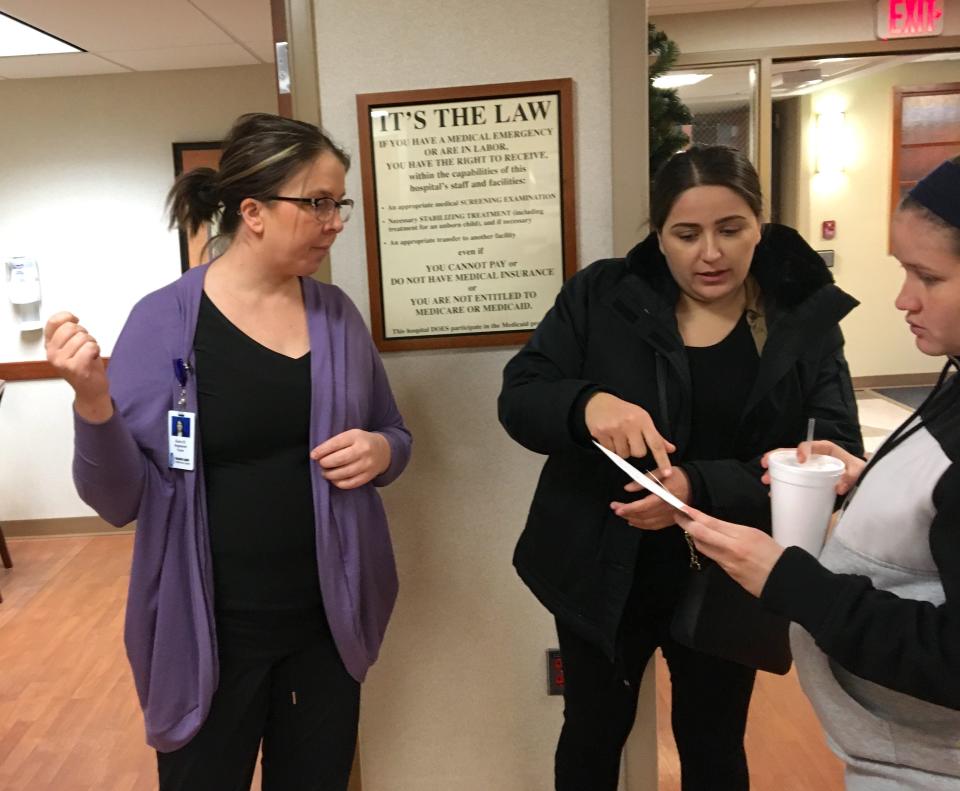Watertown resident travels to southern border, explains how immigration affects all
This month, Sister Teresa Ann Wolf, who served as the director of the Multicultural Center for several years, is at the Mexico border helping to provide temporary shelter and feed refugees and immigrants.
Wolf presented information about the current border issues at the Watertown Public Library on Nov. 1 before leaving on her latest trip.
“Anyone whose life is in danger and is at risk can approach an international border and apply for asylum. It’s an international human right,” Wolf said.
Wolf explained that although this is an international human right, the United States and several other countries fail to uphold this law and many recent immigration restrictions and policies have only caused further harm to already traumatized people.
The political tension that centers around immigration, whether illegal, legal or asylum-seeking, comes with a heavy price. That price is the failure in identifying, solving and reforming issues regarding immigration among congress. But there is also a heavy toll paid by all immigrants, regardless of their visa status. Wolf said communities also suffer from the polarization of immigration in a variety of ways.
“We cannot talk about this like reasonable people looking for solutions,” said Wolf. “We are experiencing increasing levels of anti-immigrant rhetoric. You hear and see it all the time, the stereotypes and myths about immigrants that fuel xenophobia and cause increased racial tensions and unrests.”
More: House conservatives come up short in blocking Senate map on South Dakota redistricting
Wolf has been the Mexico-United States border on several occasions throughout the years, helping those who have successfully crossed into the United States by providing temporary housing, food and clothing.
“We received immigrants every evening for supper. They stayed overnight, and we gave them breakfast in the morning. Then they were off to San Antonio before catching a flight to wherever their sponsors were located,” she said.
Immigration has a long history and has faced several challenges over the past several decades. Wolf said many presidents throughout the years have tried, and failed, to make the process safer, faster and fairer.
“President Bush made huge progress in immigration reform,” said Wolf. “And then the bombing of 9/11 happened, and that canceled all his plans. It spiked fear and suspicion of foreigners, and his plans came to nothing. Jump ahead to Obama, who could not make any immigration reform happen because of an uncooperative Congress.”
Wolf stressed that immigration reform is the responsibility of congress, and it is their inability to work together that causes failed policies and further harms the immigration process. But, although it is congress' prerogative, she said, the president does promote initiatives.
One such initiative was the Migrant Protection Protocol, also known as the Remain in Mexico policy, which made it even more of a challenge for asylum seekers fleeing for their lives.
The Trump administration enacted the Migrant Protection Protocol to keep asylum seekers in Mexico until their immigration court date. Before this protocol, asylum seekers were processed through the border into the United States and awaited their court date in safety.
More: Codington County commissioners agree to pay $9,641 in indigent hospital bills
But the protocol itself violates international law as it sent asylum seekers fleeing life-threatening situations back into the line of fire.
“While in Mexico, these people are very vulnerable to all kinds of crimes — theft, murder, rapes, human trafficking. It was a terrible policy,” said Wolf.
These asylum seekers often come with no resources — no food, no money and only the clothes on their backs. When they're not allowed into the country to wait for their court date, they must also find legal representation, which is a near-impossible task.
According to the U.S. Department of Homeland Security website – over 60% of those crossing the border seeking asylum are family units and unaccompanied children, and 60% are not from Mexico. It is these populations that were waiting in Mexico for their immigration court dates.
As the policy broke international law and put vulnerable families and unaccompanied children at risk, President Biden has ended the Migrant Protection Protocol.
On Oct. 29, 2021, Alejandro N. Mayorkas, secretary for the U.S. Department of Homeland Security released a memo that reads:

“This Administration is tackling longstanding problems that have plagued our immigration system for decades to achieve needed systemic change. The Migrant Protection Protocol does not help meet this goal. Migrant Protection Protocol had endemic flaws, imposed unjustifiable human costs, pulled resources and personnel away from other priority efforts, and did not address the root causes of irregular migration. . . It fails to provide the fair process and humanitarian protections that individuals deserve under the law.”
More: Prairie Lakes Cancer Center's new bell helps celebrate journey milestones
The Migrant Protection Protocol and subsequently the Title 42 expulsions, which kept refugees and asylum seekers from crossing the border due to COVID-19 fears, have also put the processing of immigrants at a severe backlog, said Wolf.
Not only is the backlog affecting those trying to cross the southern border and the organizations that try to assist these people, but even legal immigrants looking to renew their visa statuses within the United States are feeling these effects.
According to Evans Law in Sioux Falls, the backlog means that the processing of a green card will take at least nine months. Without a green card or other proper visa status, immigrants who reside in the United States and are educated, young, and healthy cannot work.
Maintaining legal status is part of the problem when dealing with Deferred Action for Childhood Arrivals, an immigration status that Wolf and her colleges are quite familiar with when helping immigrants in Watertown.

“Only DACA renewals are being permitted,” said Wolf. “DACA is for children who come to this country with their parents when they are very young. They grow up here, they speak perfect English, they go to school here, but yet they cannot continue to go to college or to find a job because they lack the legal documents needed to do so.”
Wolf explained that new DACA applicants are not being accepted and that only those with current DACA standings can renew their status to work and attend post-secondary education.
“Through DACA, they cannot apply for citizenship, but it does legalize their status so that they can go to college, graduate with a diploma and legally get jobs,” she said. “This adds to the life of the people of Watertown. We have helped people with their DACA applications so that they may attend Lake Area Tech. We have helped people so that they can work here and who become essential workers. Now that people who are entering adulthood cannot apply, we have many young, healthy people who want to enter the workforce and are not legally able to do so, and it’s through no fault of their own. We missed out on a whole generation of people who can contribute to our economy.”
To make positive changes, Wolf encourages people to stop the spread of misinformation about immigration and be mindful that immigrants are our neighbors, co-workers and friends. That asylum seekers are not illegal aliens.
“Contact your senators and representatives about creating fair and just immigration reform,” Wolf said. “To find a way to form a coalition of both Democrats and Republicans that will work together and tackle immigration reform, instead of just pointing fingers. To welcome immigrants — instead of condemning them — into the United States and to South Dakota.”
This article originally appeared on Watertown Public Opinion: Watertown woman explains how immigration affects all after border trip

